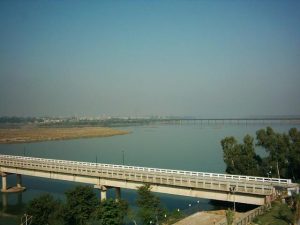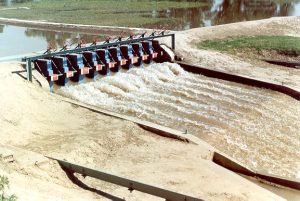River Jhelum (Urdu: جہلم) : Jhelum River is the largest and most western of the five rivers of Punjab, and passes through Jhelum District. It is a tributary of the Indus River. The valley of the Jhelum River, which includes the Vale of Kashmir, in the central portion; the mountains around Jammu in the south; and the great mountains of the Karakoram Range in the north. The Jhelum River rises in the north-eastern portion of the territory. It enters Pakistan near the Jhelum city and traverses down south to meet the Chenab River. The river was regarded as a god by the ancient Greeks, as were most mountains and streams; the poet Nonnus in the Dionysiaca (section 26, line 350) makes the Hydaspes a titan-descended god, the son of the sea-god Thaumas and the cloud-goddess Elektra. He was the brother of Iris the goddess of the rainbow, and half-brother to the harpies, the snatching winds. Since the river is in a country foreign to the ancient Greeks, it is not clear whether they named the river after the god, or whether the god Hydaspes was named after the river. Alexander the Great and his army crossed the Jhelum in 326 BC at the Battle of the Hydaspes where he defeated the Indian king, Porus. According to Arrian (Anabasis, 29), he built a city “on the spot whence he started to cross the river Hydaspes”, which he named Bukephala (or Bucephala) to honour his famous horse Bukephalis which was buried in Jalalpur Sharif. It is thought that ancient Bukephala was near the site of modern Jhelum City. According to a historian of Gujrat district,Mansoor Behzad Butt, Bukephala was buried in Jalalpur Sharif, but the people of Mandi Bahauddin, a district close to Jehlum, believed that their tehsil Phalia was named after Bucephala, Alexander`s dead horse. They say that the name Phalia was the distortion of the word Bucephala.
in the north. The Jhelum River rises in the north-eastern portion of the territory. It enters Pakistan near the Jhelum city and traverses down south to meet the Chenab River. The river was regarded as a god by the ancient Greeks, as were most mountains and streams; the poet Nonnus in the Dionysiaca (section 26, line 350) makes the Hydaspes a titan-descended god, the son of the sea-god Thaumas and the cloud-goddess Elektra. He was the brother of Iris the goddess of the rainbow, and half-brother to the harpies, the snatching winds. Since the river is in a country foreign to the ancient Greeks, it is not clear whether they named the river after the god, or whether the god Hydaspes was named after the river. Alexander the Great and his army crossed the Jhelum in 326 BC at the Battle of the Hydaspes where he defeated the Indian king, Porus. According to Arrian (Anabasis, 29), he built a city “on the spot whence he started to cross the river Hydaspes”, which he named Bukephala (or Bucephala) to honour his famous horse Bukephalis which was buried in Jalalpur Sharif. It is thought that ancient Bukephala was near the site of modern Jhelum City. According to a historian of Gujrat district,Mansoor Behzad Butt, Bukephala was buried in Jalalpur Sharif, but the people of Mandi Bahauddin, a district close to Jehlum, believed that their tehsil Phalia was named after Bucephala, Alexander`s dead horse. They say that the name Phalia was the distortion of the word Bucephala.
The waters of the Jhelum are allocated to Pakistan under the terms of the Indus Waters Treaty. The Mangla Dam in Pakistan, the twelfth largest dam in the world, was built in 1967 on Jhelum River as part of the Indus Basin Water Treaty.
